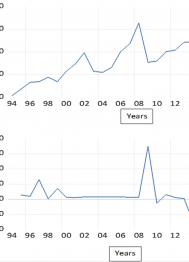
Review of studies of blockchain technology effects on the shipping industry
Decision-making is a prolific research area in the internet era, which has propelled globalization and the virtual elimination of many country border barriers. However, effective decision-making in the shipping industry is a time consuming and often complicated process. Digital evolution has provided new innovative organizational operation methods. Blockchain technology—a basic component of the Fourth Industrial Revolution—is one such innovation that promises to alter the process of decision-making. However, only a few academic studies have explored the decision-making aspect of blockchain technology. Moreover, there is a dearth of comprehensive research on how blockchain affects decisions in the shipping industry. This study explored how this novice technology can address issues, such as vast documentation and information asymmetry in the shipping industry. Specifically, grounded theory was used to qualitatively investigate extant practices and examine the potential impact of blockchain technology on decision-making in the shipping industry and the potential of using blockchain technology to emancipate decision-making. The study results indicate that the instant and reliable data-sharing capability of blockchain can significantly impact the shipping industry, while transforming its decision-making processes.
The globalization era has introduced novel trading paradigms and has increased the demand for new approaches to production and distribution that, in turn, might alter shipping operation standards forever (Lambrou et al. 2019). The complementary development of digital technologies offers innovations to many competitive industries, including shipping (Kaygın et al. 2018). It is particularly necessary to highlight the specific needs of the shipping industry regarding information management so that innovation can be pursued. The shipping industry has been the basic pillar of international trade (Filom and Van Hassel 2020) and a main component of globalization (Jović et al. 2019) for centuries.
The maritime sector operates using an information network that involves many parties, e.g., shippers, freight forwarders, and carriers (Jabbar and Bjørn 2018). Specifically, extant operation systems in the industry are characterized by bureaucracy, centralization, lack of bias, and information asymmetry (Di Vaio and Varriale 2020). Information asymmetry is a complication caused by intermediate participants in the operating process (Filom and Van Hassel 2020), considering that shipping industry systems are closely related to other integrated transportation systems (Jović et al. 2019). More precisely, maritime operations involve complex procedures that require the interaction of numerous stakeholders (Jović et al. 2019). Additionally, many rules and regulations govern the industry, making transactions rigid, complex, and expensive both temporally and financially (Jain 2018).


